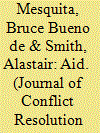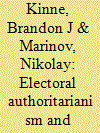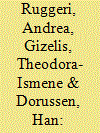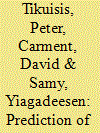|
|
|
Sort Order |
|
|
|
Items / Page
|
|
|
|
|
|
|
| Srl | Item |
| 1 |
ID:
119961


|
|
|
|
|
| Publication |
2013.
|
| Summary/Abstract |
Temporary membership on the United Nations Security Council (UNSC) has pernicious effects on the political and economic development of nations, particularly in nondemocracies. The leaders of rich democratic states often trade resources for the salient policy favors that UNSC members can deliver. This provides the leaders of temporary UNSC members with access to "easy money" resources. Such resources have deleterious consequences, particularly in nondemocracies, because they provide leaders with the means to pay off their coalition of supporters without reliance on tax revenues. While foreign aid is an important form of easy money bribe, it is but one of many. Empirical tests show loans are a substitute means for bribing UNSC members.
|
|
|
|
|
|
|
|
|
|
|
|
|
|
|
|
| 2 |
ID:
119955


|
|
|
|
|
| Publication |
2013.
|
| Summary/Abstract |
How, if at all, do nondemocratic elections affect credible signaling in international crises? While the literature on credible signaling emphasizes the importance of electoral competition, it does not specify the minimal conditions that elections must satisfy in order to enhance the credibility of threats. We address this oversight by focusing on two fundamental properties of electoral institutions: (1) the degree of proincumbent bias and (2) the vulnerability of the incumbent to a de facto loss of power following an opposition victory. Our theory argues that both decreases in electoral bias and increases in incumbent vulnerability introduce greater accountability into the electoral process and thus enhance the credibility of public threats, even when elections fail to meet basic democratic standards. We apply these insights to the case of electoral authoritarianism, that is, regimes in which some form of electoral competition exists but basic principles of democratic governance are commonly violated. Using data on reciprocation rates in militarized crises, We show that, so long as electoral biases are sufficiently low and incumbent vulnerability is sufficiently high, even electoral authoritarian regimes are able to credibly signal resolve.
|
|
|
|
|
|
|
|
|
|
|
|
|
|
|
|
| 3 |
ID:
119956


|
|
|
|
|
| Publication |
2013.
|
| Summary/Abstract |
How many peacekeepers are needed to keep the peace? Under what conditions are local governments and rebel forces more willing to cooperate with an intervention force? From a theoretical perspective in which the main role of peacekeepers is to assist local actors in overcoming their commitment problems and mistrust toward each other, it follows that sufficiently robust missions should positively affect levels of cooperation. Furthermore, any effect should be conditional on the local balance of power, that is, the military leverage between government and rebel forces. Relatively weak rebel groups-facing a stronger government-should be more willing to cooperate with larger missions. In the empirical analysis, using newly collected event data on United Nation (UN) peacekeeping operations from 1989 to 2005 in African civil wars, the authors find support for conditional effect of robust peacekeeping: there is more cooperation with UN peacekeepers when the rebels are weak.
|
|
|
|
|
|
|
|
|
|
|
|
|
|
|
|
| 4 |
ID:
119960


|
|
|
|
|
| Publication |
2013.
|
| Summary/Abstract |
In a well-publicized finding, Bueno de Mesquita and Smith argue that temporary members of the United Nations Security Council (UNSC) suffer politically and economically because they receive elevated inflows of foreign aid in exchange for votes. Closer examination of the data reveals a lack of support for this claim. Even when the analysis is limited to countries that do not enjoy temporarily increased aid during tenure, UNSC membership retains an association with poor outcomes that are disproportionately strong in nondemocratic countries, contrary to the expectation generated by selectorate theory. A separate least-likely test specification further weakens the case against foreign aid. The authors postulate and weigh alternative explanations. Temporary membership may enable deleterious state policy through a lessened fear of international sanction. Alternatively, the membership selection process may be biased in a way not currently recognized by scholars who employ UNSC election as a source of exogenous variation in the international system.
|
|
|
|
|
|
|
|
|
|
|
|
|
|
|
|
| 5 |
ID:
119957


|
|
|
|
|
| Publication |
2013.
|
| Summary/Abstract |
The primary objective of this article is to advance the development of early warning of intrastate conflict by combining country-level structural and events data in a logistic regression model calibrated and validated using split-sample cases. Intrastate conflict is defined by the occurrence of one or more highly destabilizing events collectively termed a crisis of interest (COI). Two separate two-year periods between 1990 and 2005 were examined in twenty-five globally dispersed countries. COIs occurred in about 6 percent of all the half-monthly periods examined. While model accuracy (total correct predictions of COI and non-COI) usually exceeded 90 percent, the model did not generate sufficiently high and consistent precision (correct number of COI over total predicted) and recall (correct number of COI over total observed) for practical use.
|
|
|
|
|
|
|
|
|
|
|
|
|
|
|
|
| 6 |
ID:
119958


|
|
|
|
|
| Publication |
2013.
|
| Summary/Abstract |
This article counterclaims that ideology lacks relevance to contemporary armed conflicts, especially when economic factors play an important role. Focusing on the case of Colombia, the authors utilize logistic regression analysis to test whether ideology allows one to distinguish between different armed groups and whether a combatant's level of agreement with his or her armed group is related to affinity for that group's ideology. The high degree of collinearity between three indicators of ideology-discourse, attitudes, and emotional responses-and their similar explanatory power support the article's conceptual proposal of viewing them as different dimensions of the same phenomenon. The authors find that ideology continues to play a role in the internal dynamics of Colombian armed groups and that a combatant's ideological development is influenced not only by pre-enlistment experiences but also by participation in a particular group. Future research should not ignore ideology as an important element of contemporary armed conflicts.
|
|
|
|
|
|
|
|
|
|
|
|
|
|
|
|
| 7 |
ID:
119959


|
|
|
|
|
| Publication |
2013.
|
| Summary/Abstract |
Existing nuclear deterrence scholarship evinces a pervasive "existential bias," assuming that once a state merely possesses nuclear weapons, it should be able to deter armed conflict. The empirical literature expresses this bias by simply dichotomously coding a state based on whether it has nuclear weapons, thereby treating all nuclear states as equivalent. Thus, whether nuclear weapons deter conflict, and how much is required to do so, is unclear. This article shifts the unit of analysis away from nuclear weapons to postures, hypothesizing that different nuclear postures are distinct and generate differential deterrent power, particularly amongst the non-superpower states which comprise the lion's share of nuclear powers. I find that an asymmetric escalation nuclear posture uniquely deters conflict initiation and escalation. Not only do small arsenals have little deterrence success, but I find that even assured retaliation postures fail to deter intense conventional conflict. This suggests that the deterrence dividend is distributed unequally across nuclear powers, and that states may need to do more than simply acquire nuclear weapons to successfully deter conventional attacks.
|
|
|
|
|
|
|
|
|
|
|
|
|
|
|
|
|
|
|
|
|